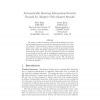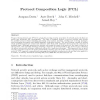576 search results - page 11 / 116 » Modeling Adversaries in a Logic for Security Protocol Analys... |
JCS
2011
13 years 2 months ago
2011
We present a model of adaptive attacks which we combine with information-theoretic metrics to quantify the information revealed to an adaptive adversary. This enables us to expres...
CRYPTO
2001
Springer
13 years 12 months ago
2001
Springer
We present session-key generation protocols in a model where the legitimate parties share only a human-memorizable password. The security guarantee holds with respect to probabilis...
ENTCS
2007
13 years 7 months ago
2007
Protocol Composition Logic (PCL) is a logic for proving security properties of network protocols that use public and symmetric key cryptography. The logic is designed around a pro...
SACRYPT
2004
Springer
14 years 25 days ago
2004
Springer
Abstract. This paper investigates the security of Proactive Secret Sharing Schemes. We start with revision of the mobile adversary model of Herzberg’s et al. imposing less restri...
PET
2005
Springer
14 years 29 days ago
2005
Springer
We review threat models used in the evaluation of anonymity systems’ vulnerability to traffic analysis. We then suggest that, under the partial adversary model, if multiple packe...


